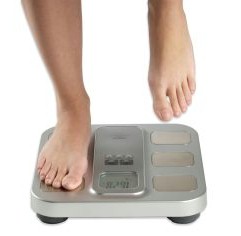From BMIs to skin calipers, there are many different tools and calculations you can perform to measure your weight. But many of these numbers are just that – numbers that are averaged from hundreds of statistics on risk factors for illness and other health predictors. What about finding your ideal weight? The one that feels good for you and most importantly, that is realistic.
In a recent health article by Karly Randolph Pitman, she elucidated five tips for finding your healthy weight. The five tips are:
1) Recognize Your Own Body and its Own History. Self magazine features a healthy weight calculator that takes into account your age, height, children and activity level. As a caveat, I took this health assessment and if I weighed what the Self Happy Weight calculator suggested I could weigh, I would not be very happy. While Pitman’s other tips for finding your ideal weight are pretty spot-on, this Self Happy Weight Calculator could use some fine-tuning.
2) Aim for a healthy body-fat percentage. Measuring your body-fat percentage takes into account your height, weight, circumference of your waist, neck and hips, as well as your activity level. Since the measurement requires precise direction in taking the measurements, here is an instructional body-fat calculator to guide you along.
 3) Use a critical eye when looking at female celebrities. The pressure to be thin in Hollywood is probably a burden that most of us can’t comprehend, nor would we like to. The key to determining your ideal weight is to refrain from comparing yourself to a super-thin Hollywood actress or singer. It may be easier said than done, but the more you practice it, the easier it will become and the more accepting of your own body you will be.
3) Use a critical eye when looking at female celebrities. The pressure to be thin in Hollywood is probably a burden that most of us can’t comprehend, nor would we like to. The key to determining your ideal weight is to refrain from comparing yourself to a super-thin Hollywood actress or singer. It may be easier said than done, but the more you practice it, the easier it will become and the more accepting of your own body you will be.
4) Be patient in your weight loss goals: Even though many diet pills and quack diets promise to help you lose 10 pounds in 4 days, these drastic weight loss plans are not only impractical, but they can also be unsafe. It took you some time to get to the weight you are today, and it will consequently take you some time to lose it.
5) Practice Non-Attachment: It’s a Buddhist concept to be able to celebrate something or someone, but also be fully aware that its existence is not permanent. Remember this as you step on the scale, think back to what your weight was in high school or remember how tough it was to lose those post-baby pounds.
These sage words of advice are as easy to apply as stepping on the scale a few times throughout the day. Your weight fluctuates not just from meal-to-meal, but from year-to-year. By surrendering to the current of change that underscores our entire lives, you will be more able to accept where you are. Now.

